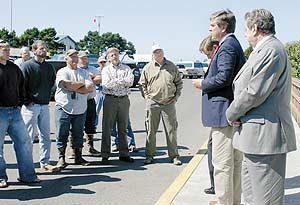|
http://www.theworldlink.com/articles/2006/12/02/news/news01120206.txt
Salmon money in limbo
By Susan
Chambers TheWorldlink.com,
December
2, 2006

|
|
World File Photos National
Marine Fisheries Service
Director Bill Hogarth, right;
U.S. Sen. Gordon Smith,
R-Ore.; and U.S. Department of
Commerce Deputy Secretary
David Sampson talk with
fishermen assembled at D-Dock
in Charleston on Aug. 10,
announcing that that Commerce
Department has declared the
commercial salmon season a
failure. Months later,
emergency funding remains in
doubt. |
The small Elk
River state fishery for Chinook
salmon near Port Orford is
ongoing, but federal funding for
West Coast commercial trollers is
stalled, tangled in a mix of
existing government budget bills
and an uncertain political future.
This summer, during the height of
the federal salmon closure and the
determination of a failed Klamath
River fall Chinook fishery, a U.S.
House of Representatives
appropriations bill included $2
million in aid to fishermen. It
passed the House in June.
Subsequently, it was sent to the
Senate and Sens. Gordon Smith,
R-Ore., and Ron Wyden, D-Ore.,
raise the aid amount to $10
million. It never passed the
Senate.
Under normal circumstances, the
Senate would pass the bill and the
Science, State, Justice, Commerce
and Related Agencies
Appropriations Act of 2007 would
be taken up during a conference
committee between the two houses
prior to the end of the
government's fiscal year.
But this isn't
any normal year.
Since October, the government has
been operating on a continuing
resolution - a time during which
agencies are funded at minimal
levels so the government can
continue to function.
It included no funding for the
salmon industry, since the current
budget included no disaster money.
Two other changes threw
monkeywrenches into the works: The
elections switched the leadership
in both the House and the Senate
to the Democrats and a new session
of Congress will start Jan.1.
In essence, existing
appropriations bills likely will
be changed or scrapped altogether
and started over from scratch in
January.
Congress must decide next week
whether to push through full
appropriations bills or pass
another continuing resolution to
get through the holidays.
A 2006 Oregon commercial and
recreational ocean salmon fishery
season-end briefing report, put
together by The Research Group for
the Oregon Coastal Zone Management
Association and the Oregon
Department of Fish and Wildlife,
shows just how bad the season was.
“Ocean
(commercial) salmon harvest volume
in 2006 was the second worst year
since 1971 - only exceeded by the
1994 season when the north of Cape
Falcon area was closed,” the
report said.
Even better-than-average prices to
fishermen of around $5 a pound for
salmon could not offset the lack
of fish.
“However, average troll Chinook
prices this year jumped 68 percent
over last year, raising total
harvest value to be the fourth
worst since 1971,” the report
added.
No matter what happens, the salmon
industry - and Klamath Basin
farmers - are continuing to push
for relief and, in some cases, an
increase of funding now that new
data has been tallied as to the
extent of the economic damage to
the industry and coastal
communities.
“The impact has spread to other
businesses that rely on commercial
fishing as well as those
frequented by fishers and their
families,” Rep. Peter DeFazio,
D-Ore., wrote in testimony before
the Federal Energy Regulatory
Commission about dams on the
Klamath River. “All told, the
states of Oregon and California
estimate the direct damage to
commercial fishers and the
downstream impacts in communities
at more than $60 million.”
That number came up again, when
Klamath Water Users Association
Executive Director Greg Addington
sent letters to House and Senate
Appropriations Committees.
“We are writing to request your
support for $60.4 million in
disaster assistance for the
Pacific coast salmon fishery,”
Addington wrote Friday. “We
understand the strain of natural
resource conflicts and we feel
that a comprehensive solution to
the basis's problems is the only
way forward. In that spirit, we
support assistance to those
communities hurt by the fish
harvest restrictions.”
Just about any funding would be
welcome as utility bills, rent,
loan payments and medical bills
begin piling up, fishermen say.
Many trollers now are waiting for
the second round of state disaster
checks to arrive in their
mailboxes or for the commercial
crab season to begin.
“I know they're antsy,” Oregon
Salmon Commission Administrator
Nancy Fitzpatrick said. “They're
concerned. They would like
something, but it's all on hold.
“Unfortunately, the (personal)
bills are not on hold,”
Fitzpatrick said. “They keep
coming.”
Trollers intend to hold
congressmen to the promises they
made this summer to help the
industry. At the same time,
staffers are working hard to deal
with a multitude of bills during
the final days of the 109th
Congress.
“Sen. Wyden is committed to
finding funding for salmon
relief,” Wyden spokesman Geoff
Stuckart said Friday. “He knows
that folks on the coast are
hurting and he will continue to
look for ways to get funds
appropriated.”
Stuckart also said all the
senators on the coast are very
concerned about the issue and plan
to work in a bipartisan manner to
make funding available.
Yet as time goes on, the
frustration levels rise.
Charleston troller Rick Goche
testified before the FERC panel on
Wednesday, too, and like other
fishermen who made statements
about the dams, also commented on
the need for federal help.
“Let us fish, pay us not to fish
or buy us out,” he said. |

